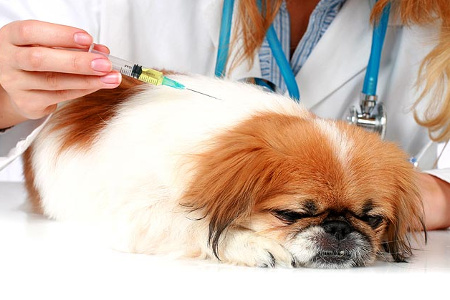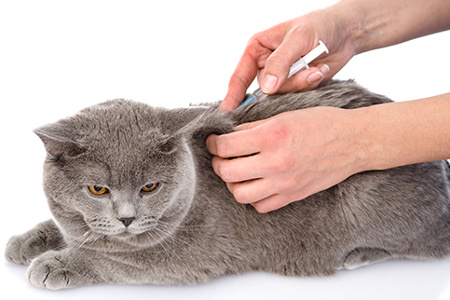Vaccinations
Since the 1950's we have been able to vaccinate our dogs and cats to help prevent them catching potentially fatal diseases. With the widespread use of these vaccines for puppies and kittens and their annual boosters we have seen dramatic reductions in the incidence of these diseases. Canine Distemper and Canine Hepatitis have almost been eradicated and once commonplace diseases like "Parvo" and "cat flu" has become uncommon.
Progressively more vaccines were developed so that we can now vaccinate against and prevent an even wider array of infectious diseases in dogs and cats. In Australia for dogs this includes Parvovirus, Distemper, Canine Hepatitis, Bordetella bronchiseptica, Parainfluenza Virus, (these five are given together as a C5 vaccination), Tetanus, Corona Virus and Leptospirosis. In Cats we can vaccinate against Panleukopenia, Calicivirus, Rhinotracheitis Virus, Chlamydia, Feline Leukaemia Virus and the Feline Immunodeficiency Virus (FIV) which causes Feline AIDS. Vaccines have also been progressively improved so that they continue to be made safer and more effective.
Over the years large body of evidence supports that the rate of adverse reactions to vaccinations in animals is very low. However with everything we do we should consider the risk/benefit of the equation.
In late 2005 the first extended duration vaccines for Distemper, Hepatitis and Parvovirus in dogs were released in Australia. Instead of requiring boosters every year as all previously available vaccines had recommended - they only require boosting every three years - they are also known as triennial vaccinations. The two most commonly seen diseases that are vaccinated against in a ‘C5’ vaccination cannot be given every three years but must be vaccinated against every year for effective immunity.
These triennial vaccines have been available in New Zealand since 2002 and similar vaccines have been available for a few years in other countries.
All vaccinations carry a small risk of reactions, - localised pain, malaise, depression and rarely allergic reactions.
At this time extended duration vaccines are only available for Parvovirus, Distemper Virus and Canine Hepatitis Virus (C3) leaving all the other diseases requiring annual boosters to maintain immunity. To provide comprehensive immunity your pet still requires annual vaccinations - just not all vaccines every year. Annual vaccinations will still be required for Bordetella & Parainfluenza (Canine or Kennel Cough) the two most common disease that we vaccinate for, as well as Corona and Leptospirosis (if protection against these is required).
2009 and beyond
Dogs:

A body of evidence has been amassed that provides strong evidence that we can reliably achieve significantly longer duration of immunity for Distemper, Hepatitis and Parvovirus in dogs than the registered 12 months using "normal vaccines". As such we recommend vaccinating for these three diseases at the puppy course, the first yearly booster and then once every three years.
Because Bordetella & Parainfluenza (Canine or Kennel Cough) are respiratory diseases rather than systemic diseases the immune system plays a slightly different role in preventing or reducing the severity of the disease…. As such the evidence is that annual vaccinations will still be required for Bordetella and Parainfluenza (and other diseases where appropriate.)
Intranasal vaccination for both Bordatella and Parainfluenza is available and evidence shows that the are the most effective vaccines. Providing a better level of immunity, faster. We routinely use this intra nasal vaccine in puppies ( with a few exceptions) and in adult dogs who are overdue for their vaccinations and require rapid induction of immunity. However, as many dogs find the application of intra nasal vaccines un pleasant we do not use intranasal vaccines routinely on adult dogs.
Intraoral vaccination for Bordatella was released in 2015. This provides equivalent protection to the intranasal vaccination in a much better tolerated delivery method. The Parainfluenza component still needs to be injected. This combination will be used routinely in most adult dogs.
Cats:

While there is some evidence that there may be an ability to reduce the frequency of vaccination against Feline Pan Leukopenia and Feline Calicivirus to once every 3 years the number of animal studies is relatively small so our confidence is low. The evidence indicates that vaccination against Feline Herpes Virus should be maintained at yearly for cats in high-risk situations. The low risk of side effects combined with the fact that Feline Herpes Virus vaccine is not available by itself means that we will continue to recommend yearly vaccination for cats.
In Australia, many vets believe that FIV has become the most important cat disease against which we can vaccinate.
The incidence of Feline Immunodeficiency Virus infection overseas is quite low and American studies on vaccinating against FIV are based on these figures. Unfortunately Australia has a much higher incidence of FIV due to environmental factors and our stray and feral cat populations and this was ignored when ‘World’ cat vaccination protocols were discussed. One recent study showed that approximately 30% of all sick cats tested at veterinary clinics in Australia tested positive for FIV.
Also America and the rest of the world do not have a blood test that can differentiate between a cat infected with FIV and a healthy cat that has been vaccinated against FIV. Australia and New Zealand lead the way in this, such that if we suspect a cat may have AIDS, even though it is vaccinated, we can still test for the disease. Because they cannot elsewhere, they recommend not vaccinating for FIV! Again, our unique Australian situation was ignored.
One important fact to note is that the FIV vaccination gives a very high level of protection against FIV infection, but it is not 100%. However, given the much higher level of FIV in Australia (including Adelaide where FIV is relatively common) and, in particular, that the disease is fatal and that there is no treatment or cure, we strongly believe and recommend vaccinating all at-risk cats against FIV. Cats get FIV from cat bites, so all cats that are not 100% indoor cats and thus are at-risk of being involved in a cat fight, are advised to be vaccinated.
FIV vaccinations must be given every year to maintain maximal immunity and protection from Feline AIDS.
Finally we are concerned about the total well being of your pet, by doing a thorough physical examination every year on your pet we dramatically improve the early detection of a large number of other diseases and can help you to take better care of your pet.